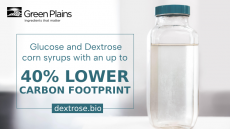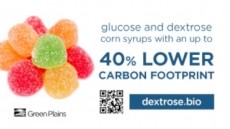‘The words entrepreneur, organic and fair trade have become abused and institutionalized’

Barnard founded his business in London in 2005 with his wife Camilla, starting with a muesli brand before expanding into cereals, snacks and drinks using only natural ingredients, and has since won awards for its taste and ethical standards.
'Time poor' world
Speaking at Amorevore Food & Wine Festival in Ibiza (October 26-28, 2018), Barnard said ‘Rude Health’ is an old medical term meaning you are strong and healthy, and he and his wife created their business over 13 years ago because they were dissatisfied with what they could eat, they were looking for healthy food to feed their children, and food that was nutrient dense that tasted great.
“It’s complete nonsense to talk about food that is bad for you or food that is clean and therefore healthy. This is something we rejected from the start because food is food and there is no such thing as healthy or unhealthy food. It is the decisions you make in your daily life in terms of how you feed your body,” he said.
“As humans, we are destined to repeat time and again the same patterns of discovery and outrage but change is one of the greatest abiding hopes I have. Young people are resistant to living in a way that has destroyed us, and the younger generation are finding the breakthrough in themselves to take action.
“I don’t like the term food entrepreneur. I am uncomfortable with the word ‘entrepreneur’ because it has become abused like the words ‘organic’ and ‘fair trade’ and become institutionalized.”
According to Barnard, all of us can make the foods Rude Health makes but the secret is sourcing foods ‘that are as good as you could possibly make if not better, in a time poor world.’
“Rude Health doesn’t have a profound point of difference but a positivity around the realm of food and drink. Food is the intrinsic remaining relationship we have between ourselves and nature,” he added.
“We have done nothing new. The nuances we bring are as marketeers and sales people. I don’t have a farm, but I know my skills are in communication and hypothecating other peoples’ ideas and making them more dynamic in stimulating a positive action as a stimulus to change.”
Barnard said in building a food business, you choose the people you work with very carefully.
From small scale to large scale
“We are seeing a relentless trend towards startups, I embrace this because it’s a wonderful evocation of what people did in villages years ago. They were farmers in their local community, running businesses that will never scale up,” he added.
“The word entrepreneur has become associated with monetizing, you have to be happy to settle with what you have or decide if you want to scale up. On Day One, I had no idea of where Rude Health would take us, not once did I think about where we were going I just let it happen.
“We have a café in Fulham (London) and the café began because we found an office space but it was too big. This is how we meandered from small scale to large scale but still remaining true to ourselves, people are the essence of your enterprise.
“We began with £4k and no long term plan, we just followed an opportunity, part serendipity, and it was fun finding touchpoints with people. For the first four years, we were a charity and believing we could communicate with more people about what it means to make wise choices about health. You have to take it slowly.
“For me, it’s about questioning every level of our relationship with the people we touch. I am relentless in asking why and how the foods we buy are the way they are. We didn’t make granola for three years until I found someone who could bake it at a lower temperature with dates and honey. An unnatural short shelf life equals short human life.”
Barnard said when it selects its suppliers, there is a thoughtfulness that goes with the decision process because he ‘will not compromise’.
“Never every compromise, this is the strength that gives you that understanding and day to day desire to continue asking questions. You cannot apply the same logic to your customers to have a patient and abiding understanding,” he added.
“Our first breakthrough was with the goji berry, it was one of the first superfoods that made that link between health foods and delicatessen speciality food, it was that hook, to propel you. We appeared in a Sunday Times (UK newspaper) feature and launched a website. We sold our muesli in brown paper bags and had over 1,000 orders in three days. We were producing the world’s most gourmet muesli that was nutrient dense.”
Packaging challenges
There were challenges along the way, however, and Barnard said they once made a mistake partnering with the wrong supermarket and the wrong packaging.
“We changed our oat supplier because we ran out of oats, but we never had another order from that same supermarket. Supermarkets in this day and age are dealing with their own crisis about what it means to be a supermarket because people are more promiscuous than ever before about their shopping habits. As a business, you need sustainable friendships and relationships. Also, you need to just keep trying,” he said.
“The same supermarket asked us to change our packaging and we did that but it failed as a result. Now I analyze whether or not a (supplier) relationship is sustainable long term.”
According to Barnard, one of the most successful relationships he has are with overseas distributors who have become friends and that’s what ‘makes doing what we do a rich and enjoyable journey’.
“Those interactions that enable you to thrive more strongly,” he added.
Barnard said it is important to educate people about what organic means. For example, in Switzerland, consumers know organic is ‘a better choice for me, my beauty, my health, my family, for the welfare of the animals, a better choice for the land, and a regenerative relationship with nature’ but some people are still confused about what organic means.
“My first principle is to have as few handshakes as possible between you and the producer of the food that you are going to be nourished by,” he said.
“In terms of cost, you can buy your bird, or a chicken and get four or five meals out of it. So the idea that it is expensive to begin then translates into the action required to extract the nutrition from that. Consumers shouldn’t feel victimized by price because they can do something about it by releasing their ancestral wisdom on how to get the most out of that food.
“This is a city-state world now. Whether we like it or not, we have to feed people in cities, but lets take it beyond that into the home and the individual. None of you can afford to not buy a little jar, and start growing your own seeds at home.
“You can prepare the most nutrient-dense flavorsome salads, so do it, take control through your own micro actions. Embrace it within yourselves, to make change, to break the spending in a commoditized food world.”


















